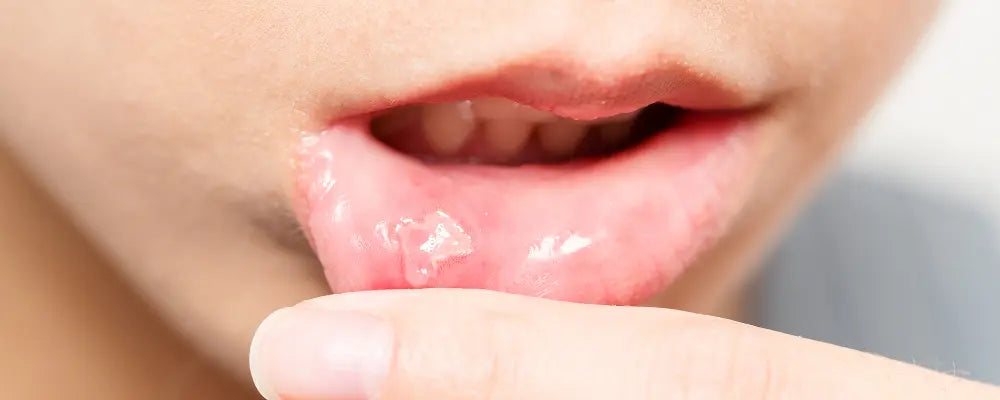As parents, we share your concern and understand how distressing it is to witness our little ones in discomfort. One common issue that can affect babies is mouth ulcer in kids, also known as "canker sores." These painful lesions can develop in the delicate oral cavity, causing irritation, difficulty eating, and general distress. Mouth ulcer in kids are particularly prevalent, as their developing immune systems and frequent drooling can create the perfect conditions for these sores to form.
Addressing baby mouth ulcer is crucial, as the discomfort can significantly impact a child's well-being and quality of life. This comprehensive guide by Care for Child will explore the causes, symptoms, and effective remedies to soothe and heal these pesky mouth ulcers in children. We can help our little ones regain their bright, happy smiles with the right care and attention.
What Causes Mouth Ulcers in Kids
Mouth ulcer in kids is a common and frustrating experience for many parents and children. These small, painful sores can appear inside the mouth, on the lips, or even on the tongue, causing discomfort and making it difficult for little ones to eat, drink, and even sleep comfortably.
But exactly what causes mouth ulcers in kids, babies and young children? Several factors can contribute to the formation of these irritating lesions:
- Immune system imbalances: A weakened or overactive immune system can trigger the development of mouth ulcers in children.
- Nutritional deficiencies: Lack of essential vitamins and minerals, such as iron, folate, or vitamin B12, can make the mouth more susceptible to ulcers.
- Hormonal changes: Fluctuations in hormone levels, particularly during periods of growth and development, can increase the risk of mouth ulcers.
- Injury or irritation: Accidentally biting the inside of the cheek or tongue or using overly abrasive oral care products can lead to the formation of ulcers.
- Stress and anxiety: Emotional stress can take a toll on the body, weakening the immune system and making children more prone to mouth ulcers.
- Underlying medical conditions: Certain underlying health issues, such as celiac disease or Crohn's disease, can increase the likelihood of recurrent mouth ulcers in children.
Understanding the root causes of these painful sores can help parents and caregivers take proactive steps to prevent and manage mouth ulcers in their little ones.
Identifying & Diagnosing Mouth Ulcer in Kids
If your child is experiencing persistent or recurring mouth ulcers, it's important to have them examined by a healthcare professional. Identifying the root cause of these painful sores can help ensure proper treatment and relief for your little one.
- Visual Inspection by a Pediatrician - The first step in diagnosing mouth ulcers in kids is a thorough visual inspection by a paediatrician. During the examination, the doctor will carefully examine the inside of your child's mouth, looking for the characteristic appearance of mouth ulcers. This assessment can help differentiate these sores from other oral health issues, such as cold sores or dental abscesses.
- Potential Need for Further Examination or Testing - In some cases, the paediatrician may recommend additional tests or examinations to determine the underlying cause of the mouth ulcers. This could include blood tests to check for nutritional deficiencies or signs of an autoimmune disorder. The doctor may also refer your child to a pediatric dentist or oral health specialist for a more in-depth evaluation.
- Differentiating Mouth Ulcers from Other Oral Issues - It's important to note that mouth ulcers in children can sometimes be mistaken for other oral health problems, such as cold sores or thrush. A trained healthcare professional can help differentiate between these conditions and provide the appropriate treatment plan. Accurately identifying the type of oral lesion is crucial for ensuring your child receives the most effective and targeted care.
By working closely with your paediatrician or oral health specialist, you can help ensure that your child's mouth ulcers are properly identified and addressed, providing much-needed relief and comfort.
Mouth Ulcer in Child Home Remedies
As parents, our top priority is providing relief and comfort to our little ones when they're distressed. Fortunately, various effective remedies and treatments are available to help soothe and heal mouth ulcers in babies and young children. So, here are some mouth ulcer in child home remedies for your reference.
- Home Remedies and Natural Solutions - A warm saltwater rinse is one simple yet powerful home remedies for mouth ulcer in kids. The gentle antiseptic properties of salt can help reduce inflammation and promote healing in the affected area. For added soothing relief, aloe vera gel can be gently applied to the ulcer, as its cooling and anti-inflammatory effects can provide much-needed comfort. To further calm and soothe your child, offering a warm chamomile tea can have a calming influence, both physically and emotionally.
- Medication Options - In cases where the discomfort is more severe, over-the-counter pain relievers and numbing gels can be used to manage the pain and discomfort associated with mouth ulcers. If the ulcers are persistent or show signs of infection, a paediatrician may prescribe medication to facilitate healing and prevent complications.
- Proper Oral Hygiene and Care - Maintaining good oral hygiene habits, such as gentle brushing with a soft-bristled toothbrush, can also contribute to the healing process and reduce the risk of recurrent mouth ulcers in babies and young children.
By incorporating a combination of these effective remedies and treatments, you can help provide your little one with the soothing relief they need during this uncomfortable experience.
Children’s Mouth Ulcers Treatment – Medical Help
While most cases of mouth ulcers in babies can be managed with home remedies and basic care, certain signs indicate the need for professional medical attention. If the ulcers are particularly large or widespread or accompanied by high fever, severe pain, or difficulty eating or drinking, it's important to consult a paediatrician or pediatric dentist right away. These healthcare providers can thoroughly examine the mouth, rule out any underlying medical conditions, and prescribe appropriate treatments if necessary.
Additionally, if the mouth ulcers persist for more than two weeks or recur frequently, it's advisable to seek medical advice. Persistent or recurring ulcers may require further investigation and specialised care to identify and address the root cause. By working closely with your child's healthcare team, you can ensure that the mouth ulcers are properly managed and that your little one receives the necessary support and treatment to achieve a swift and comfortable recovery.
Conclusion
Mouth ulcers in children can be caused by various factors, including immune system imbalances, nutritional deficiencies, and underlying medical conditions, and require proper identification and treatment for effective relief. A combination of home remedies, medication, and proper oral hygiene can effectively soothe and heal these painful lesions in babies and young children.

